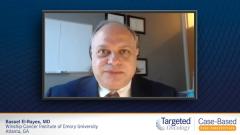
The DESTINY-Gastric01 Trial and Mechanisms of Resistance in Gastric Carcinoma
Episodes in this series
Bassel El-Rayes, MD: Now shifting gears to patients who are HER2/neu-positive in the third-line setting, we have recently seen data from the DESTINY-Gastric01 trial that have shown a benefit in attempting to retarget the HER2/neu pathway using a drug called trastuzumab deruxtecan, which is a trastuzumab molecule that is conjugated to a chemotherapy agent.
In the DESTINY-Gastric02 trial patients who were HER2/neu-positive at diagnosis were randomized on the third-line setting to either receive a chemotherapy of choice or this agent, and the trial showed an advantage of trastuzumab deruxtecan in terms of response rate, progression-free survival, and overall survival. Patients were not tested at progression for the HER2/neu overexpression, and data were used from the original tissue in the majority of patients.
The agent has a good safety profile, and the major toxicity observed in the trial was myelosuppression, in terms of neutrophils, red cells, or platelets.
In addition, a small subset, about 10%, of the patients developed interstitial lung disease and pneumonitis from this agent. While the pneumonitis was reversible in a majority of patients, it is an [adverse] effect that we have to monitor and watch for in patients receiving trastuzumab deruxtecan.
I have prescribed trastuzumab deruxtecan to a number of my patients. It is relatively easy to give, but you must monitor patients for toxicities, especially those reported in the study, including myelosuppression and interstitial lung disease. If you notice any evidence of interstitial lung disease, that would be an indication to interrupt therapy.
In the case that we presented today, this agent was used in the third-line setting in a patient who is HER2/neu-positive at the time of diagnosis.
We need additional research in order to move this drug earlier in the lines of therapy. In addition, one feature that was observed in the DESTINY trial is that patients who have higher expression of HER2/neu tend to respond better to this agent. So we need to look deeper into the role of the rebiopsies and potentially perform liquid biopsies in a better selection of patients.
These are questions that will be answered in future research. I use this drug in my practice along the lines that were described in the case: in the third-line setting in patients who are HER2/neu-positive at diagnosis.
Further, it is important as we approach patients with HER2/neu-positive gastric cancer to realize that the biology of HER2/neu-positive gastric cancer is not exactly the same as the biology of HER2/neu-positive breast cancer, where there is more experience in targeting that pathway. For example, we have learned that continuation of trastuzumab from frontline to second-line setting in gastric cancer was not beneficial. Similarly, other approaches of targeting this pathway, such as using pertuzumab and lapatinib, have not been effective in gastric cancer, but have shown effect in breast cancer.
The differences in the biology could explain the underpinning of this difference, including differences in the mechanisms of resistance to trastuzumab. These have been defined and worked out and include heterogeneity in the expression of the HER2/neu receptor in gastric cancer, and the heterogeneity in gastric cancer seems to be higher than in breast cancer. Therefore, there are differences between expression on the primary tumor and metastatic site.
Secondly, there is a subset of patients who may lose HER2/neu expression after treatment with trastuzumab, and that may present a challenge for targeting this pathway in the second- and third-line settings. The third mechanism of resistance that has been explored is the development of alternate signaling pathways. These would include MET or other signaling pathways that could result in redundant signaling, even if you block the HER2/neu pathway.
These 3 mechanisms of resistance may explain why many of these sequential strategies of targeting the HER2/neu pathway have not been as successful in gastric cancer in comparison to diseases like breast cancer.
Transcript edited for clarity.
Case: A 66-Year Old Male With HER2+ Gastric Cancer
Initial presentation
- A 66-year-old man complains of a 4-month history of decreased appetite and diffuse abdominal pain
- PMH: DM, medically controlled; colonoscopy at age 55 was unremarkable; no personal or family history of cancer
- PE: bloating; abdominal pain on deep palpation; otherwise unremarkable
Clinical Workup
- Labs: Hb 9.5 g/dL, plt 104 x 109/L; other lab values WNL
- Endoscopy with biopsy: showed well differentiated papillary adenocarcinoma with invasion into the lamina propria
- EUS: irregular borders on extraluminal surfaces with hyperechogenic spots
- Abdominal/pelvic CT confirmed a 5.1 cm lesion with indistinct margins in the antrum of the stomach
- Stage IV gastric adenocarcinoma; ECOG 1
- IHC score for HER2 expression 3+
- Biomarker testing: PD-L1 0%, NTRK -
- MSI by PCR/MMR by IHC: stable
Treatment
- He was started on FOLFOX + trastuzumab
- Well tolerated for 5 cycles
- Imaging showed 3 new small pulmonary lesions
- Treatment changed to docetaxel + ramucirumab
- Treatment was well tolerated for 4 cycles when he developed neutropenia
- Patient was started on trastuzumab deruxtecan; repeat HER2 expression score was not indicated





















